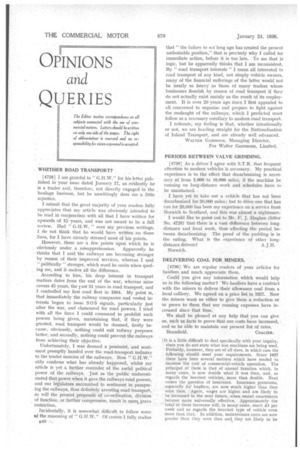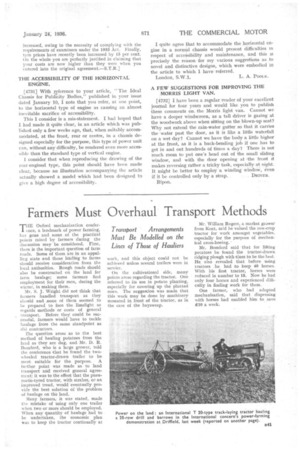OPINIONS and
Page 50

Page 51

If you've noticed an error in this article please click here to report it so we can fix it.
QUERIES
The Editor invites correspondence on all subjects connected with the use of ccmmercial motors. Letters should be written on only one side of the paper. The right of abbreviation is reserved and no responsibility for views expressed is accepted.
WHITHER ROAD TRANSPORT?
[4728] I am grateful to " G.H.W." for his letter published in your issue dated January 17, as evidently he is a trader and, therefore, not directly engaged in the haulage business, but he unwittingly does me a little injustice.
I submit that the great majority of your readers fully appreciates that my article was obviously intended to be read in conjunction with all that I have written for upwards of 15 years, and was not meant to be a full review. Had " G.H.W. " seen my previous writings, I do not think that he would have written on those lines, for I have already stressed most of his points. However, there are a few points upon which he is obviously under a misapprehension. Apparently he • thinks that I said the railways are becoming stronger by reason of their improved services, whereas I said ." politically " stronger, which word he omits when quoting me, and it makes all the difference.
According to him, his deep interest in transport matters dates from the end of the war, whereas mine covers 45 years, the rast 31 years in road transport, and I. controlled my first road fleet in 1904. My point is, that immediately the railway companies and vested interests began to issue SOS signals, particularly just alter the war, and clamoured for road powers, I tried with all the force I could command to prohibit such powers being given, maintaining that, if they were granted, road transport would be doomed, firstly because, obviously, nothing could suit railway purposes better, and secondly, nothing could prevent the railways from achieving their objective.
Unfortunately, I was deemed a pessimist, and sentiment promptly handed over the road-transport industry to the tender mercies of the railways. Now " G.H.'W." ably confirms what has already happened, whilst my article is yet a further reminder of the awful political power of the railways. Just as the public underestimated that power when it gave the railways road powers, and our legislators succumbed to sentiment in pampering the railways, thus definitely arresting road transport, so will the present proposals of co-ordination, division of function, or further compromise, result in morn grave restriction.
Incidentally, it is somewhat difficult to follow some of the reasoning of " G.H.W." Of course I fully realize B40 that " the failure to act long ago has created the present undesirable position," that is precisely why I called for immediate action, before it is too late. To me that is logic, but he apparently thinks that I am inconsistent. By "road transport interests" I mean all interested in road transport of any kind, not simply vehicle owners, many of the financial sufferings of the latter would not be nearly so heavy as those of many traders whose businesses flourish by reason of road transport if they do not actually exist mainly as the result of its employment. It is over 20 years ago since I first appealed to all, concerned to organize and prepare to fight against the onslaught of the railways, which I predicted must follow as a necessary corollary to modern road transport. I reiterate, my feeling is that, whether intentionally or not, we are heading straight for the Nationalization of Inland Transport, and are already well advanced. WALTER GAMMONS, Managing Director, For Walter Gammons, Limited.
PERIODS BETWEEN VALVE GRINDING.
[4729] As a driver I agree with S.T.R. that frequent attention to modern vehicles is necessary. My practical experience is to the effect that decarbonizing is necessary at from 5,000 to 10,000 miles, if the machine be running on long-distance work and schedules have to be maintained.
I have yet to take out a vehicle that has not been decarbonized for 30,000 miles ; but to drive one that has run for 20,000 has been my experience on a service from Norwich to Scotland, and this was almost a nightmare.
I would like to point out to Mr. F. J. Hughes (letter No. 4729) that there is a vast difference between longdistance and local work, thus affecting the period between decarbonizing. The proof of the pudding is in the eating. What is the experience of other long distance drivers? A. J.H. Norwich.
DELIVERING COAL FOR MINERS.
[4730] We are regular readers of your articles for hauliers and much appreciate them.
Could you give any information which would help us in the following matter? We hauliers have a contract with the miners to deliver their allowance coal from a local colliery. We agreed on a price list in 1927. Now the miners want us either to give them a reduction or to prove to them that our running expenses have increased since that time.
We shall be pleased at any help that you can give us, such as facts to prove that our costs have increased, and so be able to maintain our present list of rates.
Bramfield. COALIER.
lit is a little difficult to deal specifically with your inquiry, since you do not state what size machines are being used. Probably, however, they are of all sizes, in which case the following should meet your requirements. Since 1927 there have been several matters which have tended to increase the cost of commercial-vehicle operation. The principal of these is that of annual taxation which, in many cases, is now double what it was then, and, as regards the heaviest vehicles, more than double. Next comes the question of insurance. Insurance premiums, especially for hauliers, are now much higher than they were then. Again, wages are higher and are likely to be increased-in the near future, when recent enactments become more universally effective. Approximately the total of these increases will, in many cases, reach £1 per week and as regards the heaviest type of vehicle even more than that. In addition, maintenance costs are now greater than they were then and, they are likely to be increased, owing to the necessity of complying with the requirements of examiners under the 1933 Act. Finally, tyre prices have recently been increased by 15 per cent. On the whole you are perfectly justified in claiming that your costs are now higher than they were when you entered into the original agreement.—S.T.R.] THE ACCESSIBILITY OF THE HORIZONTAL ENGINE.
[4731] With reference to your article, "The Ideal Chassis for Publicity Bodies," published in your issue dated January 10, I note that you refer, at one point, to the horizontal type of engine as causing an almost inevitable sacrifice of accessibility.
This I consider is a mis-statement. I had hoped that I had made it quite clear, in an article which was pub
lished only a few weeks ago, that, When suitably accommodated, at the front, rear or centre, in a chassis designed especially for the purpose, this type of power unit can, without any difficulty, be rendered even more accessible than the standard type of vertical engine.
I consider that when reproducing the drawing of the rear-engined type, this point should have been made clear, because an illustration accompanying the article actually showed a model which had been designed to give a high degree of accessibility.
I quite agree that to accommodate the horizontal engine in a normal chassis would present difficulties in respect of accessibility and maintenance, and this is precisely the reason for my various suggestions as to novel and distinctive designs, which were embodied in the article to which 1 have referred.
London, SAVA.. L. A. POOLE.
A FEW SUGGESTIONS FOR IMPROVING THE MORRIS LIGHT VAN.
[4732] I have been a regular reader of your excellent journal for four years and would like you to publish these comments on. the Morris light van. Cannot we have a deeper windscreen, as a tall driver is gazing at the woodwork above when sitting on the blown-up seat? Why not extend the rain-water gutter so that it carries the :water past the door, as it is like a little waterfall on a wet day? Cannot we have the body a little higher at the front, as it is a back-bending job if one has to get in and out hundreds of times a day? There is not much room to put one's head out of the small sliding window, and with the door opening at the front it makes reversing rather a tricky task, especially at night. It might be better to employ a winding wind, :eVen
if it be controlled only by a strap. DenvEn. Ripon. .




















































































